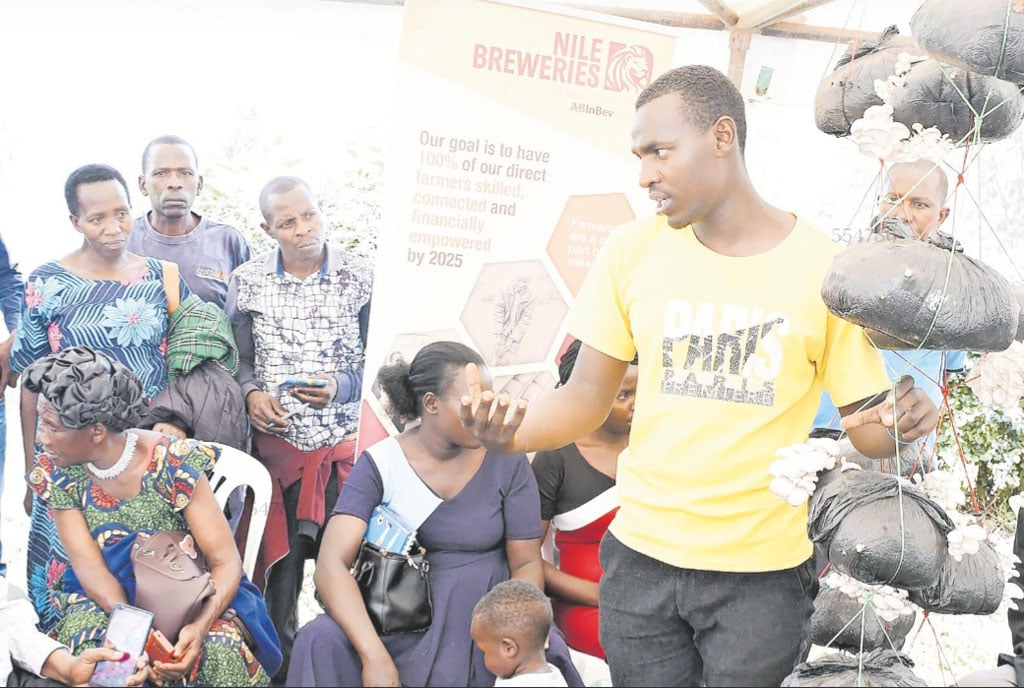Seeds of gold: Kigezi farmers acquire skills at Monitor farm clinic

What you need to know:
- David Arimpa, an ardent reader of Seeds of Gold, travelled more than 100km from Sanga in Mbarara District, accompanied by his 15-year-old son.
Some carried their diseased plants while others had notebooks and pens in their hands as they briskly scaled the hill into Kachwekano Zonal Agriculture Research and Development Institute (KaZARDI) institute in Rubanda District, last Saturday for the 40th edition of Seeds of Gold Farm Clinic.
A look at their faces and the distance some had travelled showed the thirst for knowledge the farmers had. Random chats with the farmers showed some had travelled from as far as Isingiro and Mbarara districts while others had come from Ntungamo and Rukungiri.
Waiting to engage them were experts from Naro, Bank of Uganda, Jubilee Insurance and Stanbic Bank, among others, all dressed in customised white Seeds of Gold Farm Clinic T-shirts. And there were also several exhibitors that included Nile Breweries and Kigezi goat foundation.
The lessons
The farmers’ questions were varied, from agro-inputs to pests and diseases to farm management, soil testing, crop and livestock husbandry, market for produce and agriculture financing.
Jerome Kubiriba, a soil scientist from Naro, told the farmers to first begin the planting process by conducting a soil analysis and market research to be ahead of competitors.
KaZARDI, a government facility, is among places where farmers can conduct a soil test by paying Shs50,000 for a sample delivered.
The test takes 14 days, he answered a farmer’s question, as he advised that the tests should be done early to avoid the rush associated with planting season.
nd when it came to fertiliser choice, whether for planting or top dressing, he told farmers to check the nutrient content of the package and not just buy the name.
“Don’t look at the bag, what matters is the amount of phosphate, calcium or potassium, but this will only be helpful if you have done a soil test,” he said.
Pests
David Arimpa, an ardent reader of Seeds of Gold, travelled more than 100km from Sanga in Mbarara District, accompanied by his 15-year-old son.
Arimpa, who keeps several Friesian dairy cows on an acre, attended the event to learn more about feeding his animals.
William Ego, a livestock expert from Naro, explained that low dairy productivity was becoming common in the region and linked it to inability of farmers to feed their animals properly.
“If you want to know if a feed like hay is of good quality, take a piece then dip in water for 10 to 20 minutes. If it turns to green, then you know it is of good quality if not, it is bad.”
He asked farmers not to dry feeds directly in the sun but under a shade and recommended caliandra and sesbania fodder crops, which are high in protein.
Dr Jerome Kubiriba, the KaZARDI research director, said the institution mainly focuses on Irish potato research across the value chain since they are located in the Irish potato-growing Kigezi zone.
“We have over the period developed a new high yielding varieties that are resistant to diseases,” he said.
Advice
Dr Sadik Kassim, the deputy director general of Naro, who was among the key speakers at the ceremony emphasised land consolidation, intensive agricultural practices, soil conservation and the integration of crop and livestock farming as key aspects of improved farming that can drive the farmers from poverty.
“With good farming practices, a farmer can earn Shs6 million from one acre planted with Irish potato per season under good farming practices. Soil conservation such as the construction of terraces, contours, planting trees that fix nitrogen in the soil besides being as animal feeds, planting cover crops that saves soil particles from erosion and the application of organic manure can boost crop harvests. You must work hard to fight poverty,” Kassim said.
He added that agro-tourism should also be practiced in Kigezi region because model farmers can earn extra income from tourists and researchers who visit the area and Naro is ready to support farmers with clean seed and technical skills required to boost agriculture in the region to develop a knowledge- based economy.
The deputy director in-charge of agricultural credit facility at Bank of Uganda, Mr Alex Lwanja and the Stanbic Kabale branch manager, Mr Amon Tiberondwa, explained the different products offered by their respective institutions and encouraged the farmers to take advantage of the same to boost their agricultural practices.
“Eligible farmers should take advantage of the agriculture credit facility and the small business recovery fund available at Bank of Uganda to boost their farming practices. Loan amounts under the agriculture credit facility are determined based on assessment and appraisal of project cost and genuine credit needs in accordance with lending policy,” Mr Lwanja said.
The head of the commercial section of the Nation Media Group-Uganda, Mr Sam Barata, pledged continued support to skilling farmers through its partners such as Naro and linking them to financial institutions where they can get money to boost their farming practices.
“I want to thank Naro for being our main partners and to our sponsors, we are grateful for the support that made this activity successful. We encourage farmers to keep coming for these training sessions and ask whatever you want to learn to improve your farming practices,” Mr Barata said.
Mr Obed Kitabutuka, who represented the Rubanda District LC5 chairman, Mr Stephen Kasyaba, appealed to the farmers to use the skills acquired from the farm clinic training to improve their farming practices to boost their household incomes.
“I am sure that the skills acquired from these farm clinic training will help you in improving farming practices in the Kigezi region. Use the funds received from the different government programmes of Parish Development Model, Youth Livelihood Programme, UWEP, Emyooga and GROW to boost your farming practices to overcome subsistence farming and enjoy the cash economy,” Mr Kitabutuka said.
Dr Roland Agaba a senior research officer at KaZARDI and lead for apple research and development in Uganda, asked farmers in the Kigezi region to embrace apple farming as the area has vast fertile lands, appropriate soil and climatic conditions suited for the cash crop.
“This region is well suited for apple farming. Embrace it to reduce over dependence on Irish potatoes,” he said. Dr Agaba said the event was a testimony to farmers’ quest to gain more knowledge to enable them have bumper harvests and earn more income.




